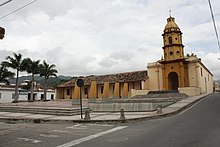Historical Complex of the Great Convention

The Historical Complex of the Great Convention (Spanish: Complejo Histórico de la Gran Convención) is a colonial construction located in Ocaña, Colombia. It consists of the temple of San Francisco, the adjacent convent and the square of the Gran Convención. Its construction began in 1584 by the Franciscan religious order. The complex has a museum with historical artifacts. The Historical Complex is a property of cultural interest of national character.[1]
History
[edit]The construction of the building began in 1533 and took about 50 years to complete. The building is considered the first cloister in Ocaña of the Franciscan communities, whose objective was to evangelize the indigenous population of the area.[2] The building was used for liturgical ceremonies as well as for the instruction of young people, mainly teaching grammar and rhetoric.[3] On April 9, 1928, the convention was held at the temple.[4] During the convention, after a religious ceremony, Francisco Soto made a speech that contained some criticisms of the government of Simón Bolívar.[5] The purpose of the convention was to reform the 1821 Cúcuta Charter.[6] In 1849, after liberal policies and the creation of the province of Ocaña, the convent was suppressed and the building was given to the municipality for educational purposes.[3] The historic complex was declared a national heritage site in 1937.[7] By means of Law 10 of 1977 issued by the National Government, a museum was created in the historical complex under the supervision of the Academy of History of Ocaña, after the law was issued, part of the building was remodeled and the objects of the Convention were recovered.[3]
Collections
[edit]The building contains artifacts from politicians who attended the 18th century convention.[8] The museum documents the disagreements between supporters of Simón Bolívar and Francisco de Paula Santander.[7] The building contains a historical archive, as well as collections of documents and books.[3] The museum contains an oil painting of Barbara Vicenta Lemus Jácome, a woman who attended the Convention in 1828, which was restored by the painter José Miguel Navarro Soto, this painting is in the museum of the Historical Complex.[9]
References
[edit]- ^ Ramírez, Carolina (2014-10-05). "SOS por el patrimonio histórico de Ocaña, en Norte de Santander" [SOS for the historical heritage of Ocaña, in Norte de Santander]. El Tiempo (in Spanish). Retrieved 2022-02-04.
- ^ "Complejo histórico de San Francisco de los más visitados en Ocaña" [San Francisco historical complex one of the most visited in Ocaña]. La Opinión (in Spanish). 2016-01-07. Retrieved 2022-02-04.
- ^ a b c d Sarabia, Javier (2021-10-09). "Urge intervención en el Complejo histórico de San Francisco de Ocaña" [Urgent intervention needed at the San Francisco de Ocaña Historic Complex]. La Opinión (in Spanish). Retrieved 2022-02-04.
- ^ Henry, Velasco, Omar (2018-08-31). El gran general: Más allá del poder y la gloria (in Spanish). Editorial Universidad del Cauca. ISBN 978-958-56724-0-6.
{{cite book}}: CS1 maint: multiple names: authors list (link) - ^ López, Javier Ocampo (2010). El cura Juan Fernández de Sotomayor y Picón y los catecismos de la Independencia (in Spanish). Universidad del Rosario. ISBN 978-958-8378-95-4.
- ^ Riveros, Luis Humberto Hernández; Luna, Luisa Fernanda Becerra; Celín, Yara Elizabeth Rueda (2021-02-10). El Catatumbo: Tensiones, territorio y prospectiva - Una apuesta desde la biopolítica (in Spanish). Universidad Nacional de Colombia. ISBN 978-958-794-249-1.
- ^ a b "Ocaña, una ciudad de encanto en el Norte de Santander" [Ocaña, a city of charm in the North of Santander]. Panorama Cultural (in Spanish). 2019-06-21. Retrieved 2022-02-04.
- ^ Salamanca, Guillermo. "Ocaña: La ciudad linda de los Caro" [Ocaña: The beautiful city of the Caro family]. Eje21 (in Spanish). Retrieved 2022-02-04.
- ^ "La mujer que se vistió de hombre para asistir a la Gran Convención de Ocaña". La Opinión (in Spanish). Retrieved 2022-02-04.
